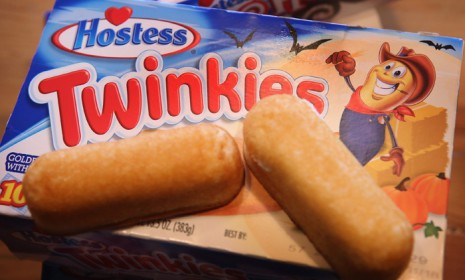Did Big Labor kill the Twinkie?
Hostess — the 82-year-old manufacturer of Twinkies, Wonder Bread, Ding Dongs, and other iconic foodstuffs — is shutting its doors after a crippling nationwide strike

A free daily email with the biggest news stories of the day – and the best features from TheWeek.com
You are now subscribed
Your newsletter sign-up was successful
On Friday, Hostess Brands announced that it would enter liquidation, ending an 82-year run during which it loomed large over the American junk-food-scape. The maker of Twinkies, Ding Dongs, and Ho Hos, as well as staples like Wonder Bread, said it had been brought to its knees by a nationwide strike by the Bakery, Confectionery, Tobacco Workers and Grain Millers Union. Earlier this week, CEO Gregory Rayburn had warned that liquidation would be the company's only option if the workers didn't end their strike, which brought operations to a standstill in two-thirds of Hostess factories across the country.
As a result, Hostess will lay off nearly all of its 18,500 employees, a number large enough to affect the national unemployment rate. (The U.S. economy in October added 171,000 jobs.) Product shipments will continue until the company's remaining supply runs out, and, thanks to the Twinkie's freakishly long shelf life, aficionados and nostalgists will have extra time to indulge. And analysts say there's a good chance that another company will buy up Hostess' assets, possibly giving the Twinkie and Wonder Bread a new, more stable home.
Is Big Labor to blame for Hostess' demise? At first glance, it appears so. "The notion that it's better to send 18,500 people to the unemployment lines and dissolve — not merely sell, but break up and eviscerate — a venerated company is the sort of zero-sum mentality that should send American workers fleeing from organized labor," says Jennifer Rubin at The Washington Post.
The Week
Escape your echo chamber. Get the facts behind the news, plus analysis from multiple perspectives.

Sign up for The Week's Free Newsletters
From our morning news briefing to a weekly Good News Newsletter, get the best of The Week delivered directly to your inbox.
From our morning news briefing to a weekly Good News Newsletter, get the best of The Week delivered directly to your inbox.
However, the company had already entered Chapter 11 bankruptcy proceedings in January, long before workers began their strike on Nov. 9 to protest a new contract that cut wages and benefits. The company had "endured wars, countless diet fads, and even an earlier Chapter 11 filing," says Michael J. De La Merced at The New York Times. "But with the national appetite for the junk food of yore on the wane, the baked-goods maker fell on hard times." Union officials stubbornly blame the company, arguing that its closing was "the result of nearly a decade of financial and operational mismanagement that resulted in two bankruptcies, mountains of debt, declining sales, and lost market share."
Still, surely the union didn't want the dispute to end with everyone losing their jobs. The union bosses "thought they had all the negotiating leverage," says ZeroHedge, "until they led their bankrupt employer right off liquidation cliff." They won, but it was a pyrrhic victory, to say the least.
Sources: Bloomberg, The Wall Street Journal, The Washington Post, ZeroHedge
A free daily email with the biggest news stories of the day – and the best features from TheWeek.com